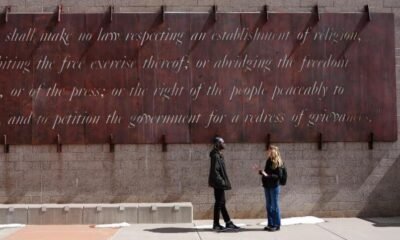clean elections commission
Sen. Hoffman Slams Clean Elections Commission Over Controversial Debate Ruling

By Daniel Stefanski |
In a significant move to uphold electoral fairness, Arizona State Senator Jake Hoffman is demanding accountability from the Arizona Clean Elections Commission regarding its recently adopted rule for candidate debates. This marks Hoffman’s second letter to the Commission, which mandates that candidates must secure at least 1% of total primary votes to qualify for participation in general election debates.
Hoffman’s latest correspondence urges the Commission to adhere to standard rule-making procedures and allow all qualified candidates to engage in debates until new regulations are transparently established. He asserts, “Arizona law only provides the Commission with discretion on how debates are conducted, not the power to exclude candidates arbitrarily.” The Senator emphasizes that a transparent process is crucial for maintaining public trust and upholding the Arizona Administrative Procedures Act (APA).
The catalyst for Hoffman’s inquiry was the announcement that Green Party candidate Eduardo Quintana would be barred from the October debate involving Republican Kari Lake and Democrat Ruben Gallego. Quintana garnered just 282 votes in the primary, falling short of the Commission’s threshold.
Hoffman argues that the Commission’s actions contravene the 2018 voter-approved Proposition 306 since the rule wasn’t submitted for approval to the Governor’s Regulatory Review Council. In a reply, Thomas Collins, Executive Director of the Commission, defended the decision as a discretionary one based on consultation with debate production experts, claiming it did not constitute a formal rule change.
Hoffman countered this defense, calling Collins’s reasoning “fluff” and reiterating that the Commission’s role is to implement legislative policy, not establish it. He argues for the necessity of a duly passed rule to justify excluding any candidate, particularly a recognized party candidate.
In a response to the controversy, the Arizona Green Party articulated their objections via social media, stating that the ban on their candidates violates Arizona law by misusing public resources to limit voter choice. They criticize the Commission for fostering a false binary choice between Democrats and Republicans, calling it an unfair electoral practice.
As the debate between Kari Lake and Ruben Gallego took place on October 9, the implications of Hoffman’s actions and the Green Party’s protests highlight ongoing tensions regarding candidate representation in Arizona elections. The situation raises key questions about the integrity and inclusiveness of the state’s electoral processes.


















